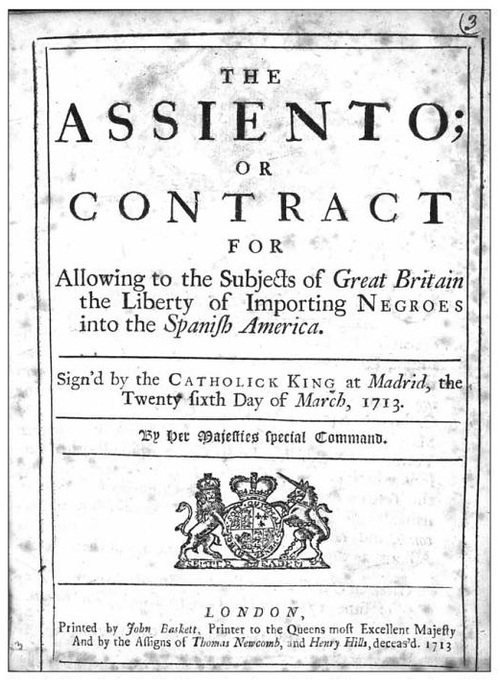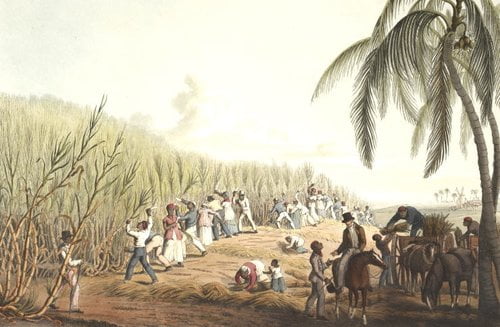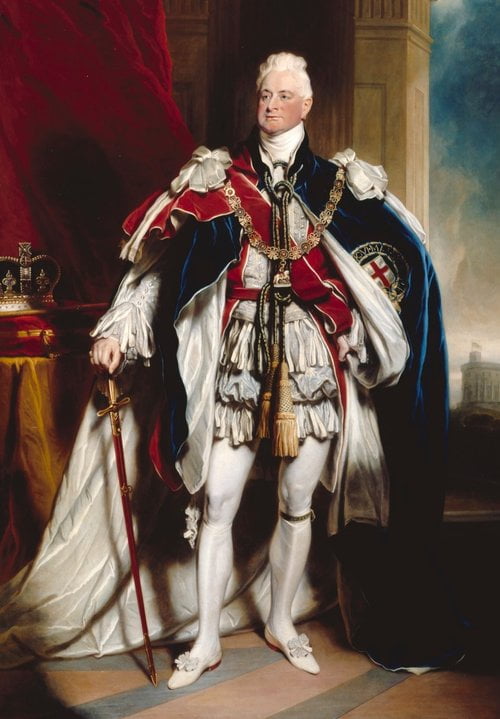1714 Queen Anne died childless, and the throne passed to the nearest Protestant successor, George, Elector of Hanover, now King George I of Great Britain, first Monarch of the House of Hannover.
Though German and more concerned with their German realm, the first two Hanoverian Monarchs continued to profit from the slave trade. George I was a significant shareholder in the South Sea Company (a slave trading enterprise) and served as its Governor for a time, like his predecessor James VII and II and the Royal African Company.

The ‘Asiento’ which granted the South Sea Company a monopoly on the trade of African into slavery in the Spanish Empire
The ‘Assiento’
The South Sea Company’s monopoly on the trade of slaves to the Spanish colonies in South America, whilst lucrative, was ultimately unprofitable, and its artificially high stock price plummeted in the 1720 South Sea Bubble. Despite these woes, it is estimated that George I made a tidy profit from his investment.
George II followed his father in his preoccupation with Hannover and his involvement in the slave trade. Like him, George II served as a Governor of the SSC and was also invested heavily in the enterprise. In the nearly 30 years that the SSC held the monopoly on the slave trade with Spain’s Empire, the SSC transported 41,923 African captives on its ships between 1714 and 1740. More than 7,000 people are estimated to have died on these voyages.
An Indirect Influence
Unlike his predecessors, George III was more involved in imperial policy, though he did not directly profit from slavery in the same way. Instead, he did this through his involvement in the American War of Independence, and through his defence of the slave trade.
George III’s response to the unrest in the American colonies can best be described as hard-line. He was in his own words ‘the last to consent to separation’ and advocated waging war on the rebellious colonies until Britain prevailed. He directly influenced the war and was pivotal in pushing the American rebels to move to independence given his outright refusal to read their Olive Branch petition in 1775 which declared their loyalty to the throne and requested royal intervention to stop any conflict.

British sugar plantation in the Caribbean, 1823
Whilst his influence on the American war is well known, George III also used his position to influence policy regarding slavery and the slave trade. Despite his early protestations regarding the slave trade, George III (1760-1820) was a vociferous defender of both the transatlantic trade and slavery itself. George III utilised his influence as Monarch to oppose abolitionists at every turn. These efforts were partially successful as although the slave trade was abolished in 1807, George III’s opposition had delayed that significantly.
George III was not the only royal involved in frustrating the abolitionist movement. His son and heir, George IV (1820-1830) also used his influence to delay abolition as long as possible. His third son, the Duke of Clarence and future King William IV (1830-1836) intervened during a House of Lords debate on a Parliamentary bill that aimed to limit the operation of the slave trade in 1799.

King William IV, stalwart defender of British slavery and the transatlantic slave trade
“For the sake of humanity, therefore, my Lords—and I repeat it—for the sake of humanity—this Trade ought to continue; for how many thousands, how many millions of lives have been saved in the Kingdom of Dahomy! and how much bloodshed has been spared amongst the wretched and miserable victims in that quarter of the globe, thus rescued from the knife”.
“It is not to your Lordships that I address this observation, because it is with real pleasure I observe, that all the idea of inhuman treatment from the British planter to the slave was done away in the opinion of your Lordships, shortly after the investigation first took place, by the examinations at the Bar of this House. I mention this, my Lords, that as an eyewitness and a resident for some years amongst those West India planters, I may bear witness to their good conduct, to their humanity, and to the care and attention of their Slaves.”- Extracts from the maiden speech of the Duke of Clarence and future King William IV to the House of Lords in 1799.
This speech and the beliefs it demonstrates were formed from William’s experience as a Naval officer in British America and West Indies, where he mingled with slave owners and readily adopted their outlook. To William, the slave trade was not merely an economic necessity but a moral and positive force.
There were some prominent anti-slavery advocates within the Hanoverian dynasty. George III’s nephew and son-in-law Prince William Frederick, Duke of Gloucester and Edinburgh, was a vocal abolitionist and supported the movement from his position within the House of Lords. Frederick would later serve as the first president of the African Institution, an abolitionist organisation founded to enforce the Abolition Act that abolished the slave trade in 1807.
Ultimately the Hanoverian dynasty was, like the Stuarts before them, intimately involved in the slave trade. Despite the fact that the Monarchy’s power greatly eroded between 1714 and 1837, successive Monarchs all acted in the interests of the slave owners.